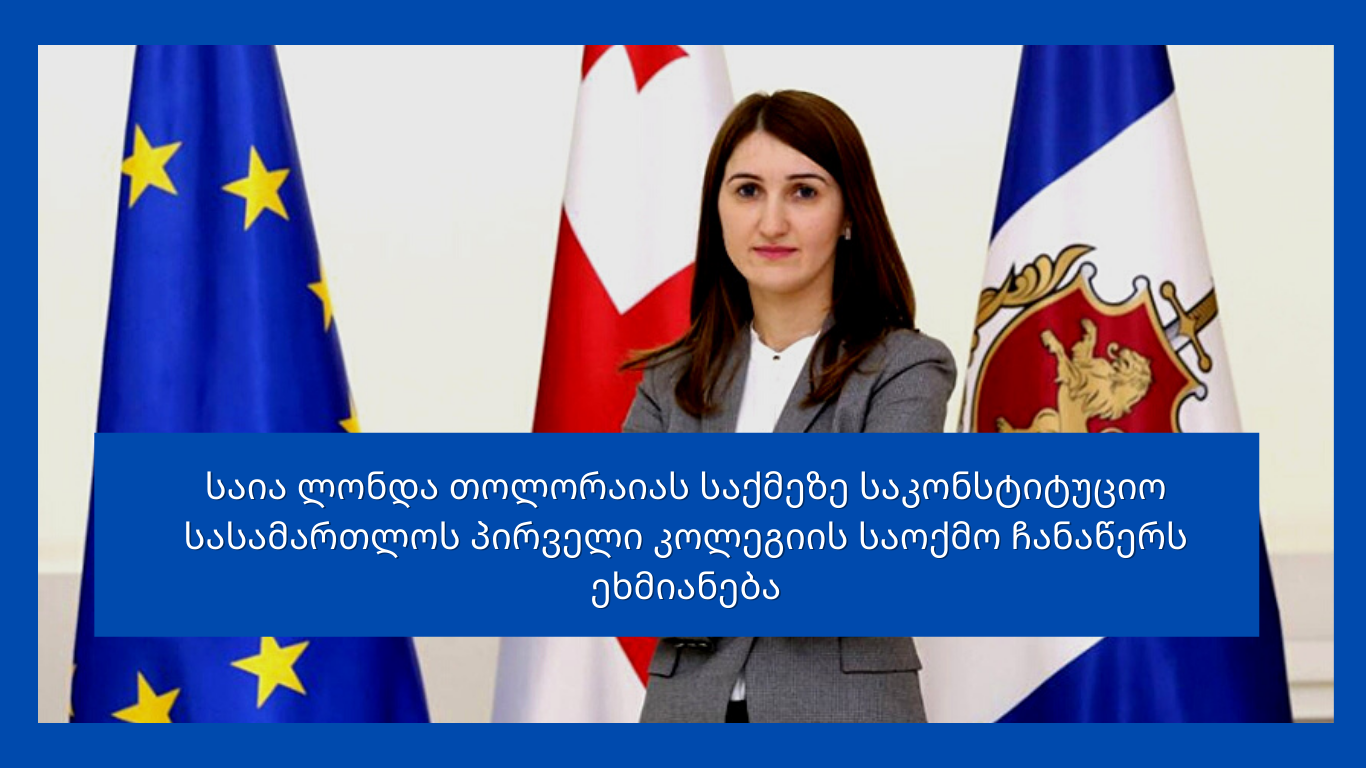


On February 28, the First Panel of the Constitutional Court, which is considering the claim of Londa Toloraia against the dissolution of the Office of the State Inspector Service and her early dismissal, rejected the plaintiff's request for suspension of the disputed norms by Court Minutes (Recording notice). The Court Minutes (Recording notice) are accompanied by a DissentingOpinion of Judge Giorgi Kverenchkhiladze, who disagreed with the three judges of the Panel and considered that the Constitutional Court should suspend the validity of the disputed norms until a final judgment is made on the case. According to GYLA, the Court Minutes (Recording notice) adopted by the First Panel of the Constitutional Court lack legal justification and contradict the practice of the Constitutional Court of Georgia.
The Constitutional Court points out to the plaintiff that if the Constitutional Court finds the disputed norms unconstitutional, “they will limit the position of the State Inspector Service from the moment they set the factual and legal consequences, specifically from the first of March. Therefore, termination of the position of State Inspector Service for the plaintiff will be unconstitutional from the moment the norms come into force."[1] The legal effects of the judgment of the Constitutional Court are determined by the Organic Law on the Constitutional Court of Georgia[2], according to which the satisfaction of the constitutional claim on the issues provided for in Article 19 paragraph 1, sub-paragraphs (a) (e) and (l) of the Organic Law, as well as in the cases provided for in sub-paragraph “m” of paragraph 1 of the same Article and paragraph 2, confirmation of the unconstitutionality of a normative act or part of it, shall result in the declaration of invalidity of the normative act or its part as invalid from the moment of publication of the relevant Judgment of the Constitutional Court. While the Organic Law invalidates a norm known unconstitutional by a Judgment of the Constitutional Court from the moment the Judgment is published, it is unclear on what legal basis the First Panel of the Constitutional Court indicates that the termination of the position of the State Inspector Service will be unconstitutional from the moment the norms enter into force.
According to the Court Minutes (Recording notice), "the Constitutional Court could not be convinced that only in the case of suspension of the disputed norms it would be possible to restore the violated rights of the plaintiff, and in case of non-suspension it will be impossible." [3] As stated in the Minutes (Recording notice), the First Panel of the Constitutional Court considers that even if the disputed norms are not suspended, if the claim is satisfied, it will be possible to restore the rights of the plaintiff. Nevertheless, the Constitutional Court does not name which mechanism provided by law allows the plaintiff to restore his/her rights. Thus, the Constitutional Court shifted the burden of proof to the plaintiff on a circumstance that could not be confirmed.
The First Panel of the Constitutional Court juxtaposed the legal expectations of the plaintiff and the head of the Special Investigation Service elected by the Parliament of Georgia and the head of the Personal Data Protection Service in resolving the issue. It is important to note that the plaintiff appealed to the Constitutional Court on January 28, 2022, and the heads of the two new services were elected by the Parliament of Georgia on February 15, 2022. At the time of filing a claim with the Constitutional Court, it was known that the procedure for electing two new heads of service was going on in parallel, so it could consider suspending the disputed norms before their election, thus avoiding conflict of rights between the said persons. In contrast, the Minutes (Recording notice) were formally published by the First Panel of the Constitutional Court on 28 February at 17:14. Such a delay raises the suspicion that the First Panel of the Constitutional Court, by delaying the issue, waited for the election of two new heads of service to use their legal interests to juxtapose the plaintiff's interests, which would influence the final judgment.
Finally, for the First Panel of the Constitutional Court, the juxtaposition between the legitimate aim of adopting the disputed norm and the plaintiff's interests proved to be important. Juxtaposing the legitimate objective of the plaintiff's claims and the adoption of the impugned norms, the First Panel of the Constitutional Court shifted the scales in favor of the latter in such a way as not to thoroughly examine how real the threat of conflict of interest was.
GYLA considers that the Minutes (Recording notice) taken by the three judges of the First Panel of the Constitutional Court lack legal argument, are based on theoretical reasoning, and are not in line with the current practice of the Constitutional Court on the issue of suspending disputed norms.
[1] Minutes (Recording notice) of the Constitutional Court of Georgia N1/1/1673 of February 28, 2022 in the case “Londa Toloraia v. Parliament of Georgia, II-22
[2] Article 23, Part 1.
[3] Ibid. II-25.
ჯ. კახიძის #15, თბილისი, საქართველო, 0102 ; ტელ: (995 32) 95 23 53; ფაქსი: (995 32) 92 32 11; ელ-ფოსტა: gyla@gyla.ge; www.gyla.ge
15, J. Kakhidze str. 0102, Tbilisi, Georgia. Tel: (995 32) 95 23 53; Fax: (995 32) 92 32 11; E-mail: gyla@gyla.ge; www.gyla.ge